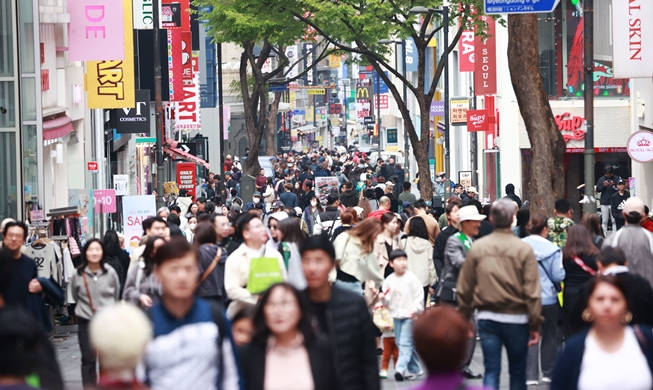-
 Korea.net's 24-hour YouTube channel
Korea.net's 24-hour YouTube channel- NEWS FOCUS
- ABOUT KOREA
- EVENTS
- RESOURCES
- GOVERNMENT
- ABOUT US
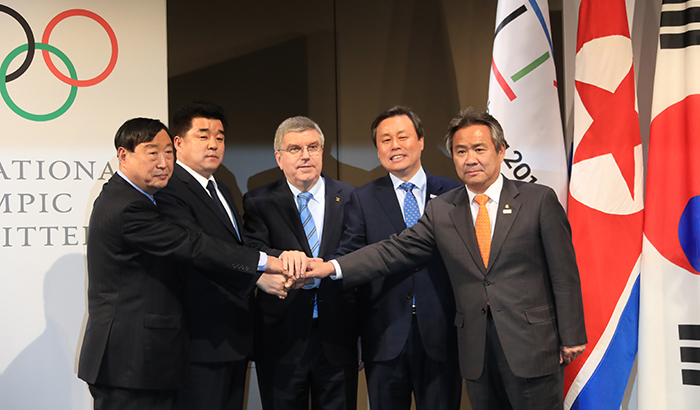
PyeongChang Organizing Committee President Lee Hee-beom (left), North Korean Sports Minister Kim Il-guk (second from left), International Olympic Committee (IOC) President Bach (center), Korean Minister of Culture, Sports and Tourism Do Jongwhan (fourth from left), and President of the National Olympic Committee (NOC) of Korea Lee Kee-Heung pose for a photo following the signature of the Olympic Korean Peninsula Declaration, in Lausanne, Switzerland, on Jan. 20. (Yonhap News)
By Lee Hana
Even before his inauguration, Korean President Moon Jae-in has been advocating the launch of an "Olympics of Peace" on the Korean Peninsula.
As a presidential candidate, he expressed his belief that North Korea's participation in the PyeongChang 2018 Olympic and Paralympic Winter Games would set in motion a series of peace-filled initiatives that would help improve inter-Korean relations.
Even during his days as the leader of the Minjoo Party, Moon was resolute about the need to highlight peace in the Winter Games.
During his visit to Gangwon-do Province on Jan. 25, 2017, the backdrop for this year's PyeongChang Olympics, Moon stressed that North Korea’s participation in the Games would be the first step toward easing tensions between Seoul and Pyongyang.
“We could hold a special ceremony at North Korea’s Geumgangsan Mountain, not far from our Olympic host cities, on the eve of the launch of the PyeongChang Games. Such an initiative would surely transform Gangwon-do Province into a special self-governing province for peace,” he said.
A few months later, on May 10, Moon Jae-in was sworn in to serve in the 19th presidential term of the Republic of Korea.
Just four days into his presidency, President Moon’s policies on North Korea were met with a striking challenge. On May 14, North Korea launched a ballistic missile that landed in the East Sea.
Moon, who had come into office with a proactive engagement policy toward North Korea, combining dialogue with a strong dose of sanctions, faced a rocky road ahead.
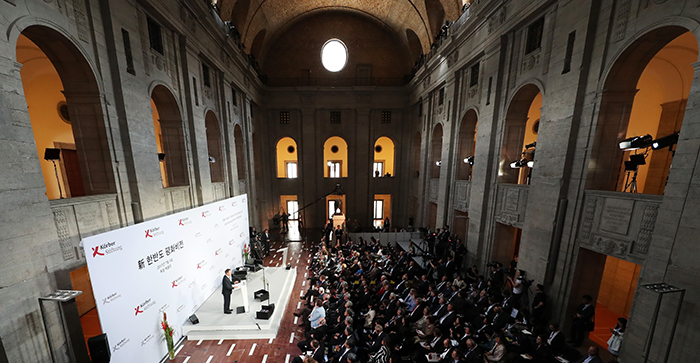
President Moon Jae-in is invited to speak at the Korber Foundation where he outlines his administration's peace initiatives, at Berlin's Old City Hall on July 6, 2017. (Cheong Wa Dae)
The months that followed saw Pyongyang carry out a number of ballistic missile and nuclear weapons tests. Such provocations were strongly condemned by the U.S. and the international community. As tensions escalated, stronger sanctions were imposed on the Northern regime.
Despite this, President Moon didn’t give up his peace agenda nor his hopes for dialogue. While in Germany for the 2017 G20 Hamburg summit, he unveiled his peace initiative for the Korean Peninsula at Berlin’s Old City Hall on July 6.
At the same historic spot where the German Unification Treaty was negotiated in 1990, President Moon outlined the direction he would take in dissolving the Cold War structure and in establishing lasting peace.
With this, the president pointed to the denuclearization of the Korean Peninsula, guaranteeing security, and a comprehensive approach to uprooting the nuclear weapons issue, starting with dialogue.
Furthermore, he outlined additional measures, such as making the PyeongChang Winter Games an Olympics of Peace with the active participation of the North, halting acts of hostility along the Military Demarcation Line (MDL), and starting an inter-Korean dialogue between the two Koreas.
In the North, the development of ballistic missiles and nuclear weapons forged onward. In response, the U.N. Security Council condemned North Korea's actions and threats, demanding Pyongyang abandon all its nuclear weapons programs.
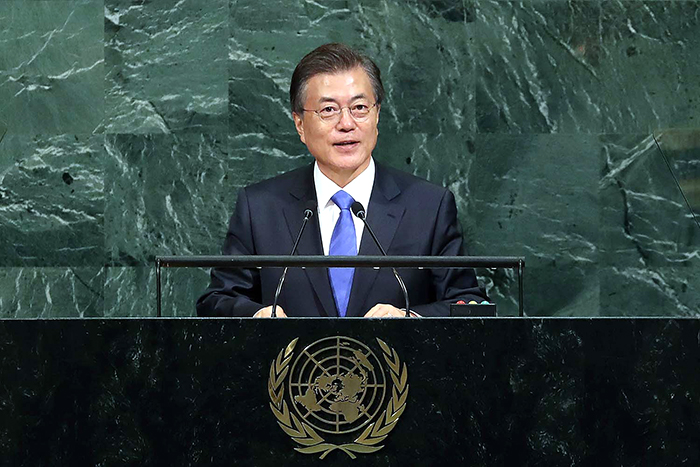
President Moon Jae-in talks about his administration's peace-oriented inter-Korean policy goals in his keynote speech to the 72nd U.N. General Assembly at U.N. headquarters in New York on Sept. 21, 2017. (Cheong Wa Dae)
Amid added pressures, the South Korean government resolutely urged for both dialogue and sanctions.
On Sept. 21, 2017, President Moon delivered a speech before the 72nd U.N. General Assembly where he talked about Seoul's inter-Korean policies, which emphasize peace and diplomacy.
Urging North Korea to come forward for dialogue, the president stressed that the PyeongChang Winter Games were an opportunity for Northeast Asia to boost cooperation and to take a turn toward peace.
“I’m filled with joy when I imagine North Korean athletes entering the stadium during the Opening Ceremony, cheered on by inter-Korean supporters and by the world at large. To turn this dream into a reality, I will work with the International Olympic Committee (IOC) in every way possible,” he said.
With the dawn of the new year, North Korea finally responded to its southern neighbor's persistent proposals for peaceful diplomacy.
In a New Year's speech broadcast on Jan. 1, North Korean leader Kim Jong-un declared his wish for a "peaceful resolution with our southern border" and offered talks about sending a delegation to the Winter Olympics in Pyeongchang next month.
In response, President Moon said that he was pleased that North Korea had accepted the South's offer to turn the PyeongChang Winter Games into a launch pad for better inter-Korean relations.
On Jan. 2, the Korean government made a formal proposal to hold high-level talks with North Korea at the Panmunjom truce village on Jan. 9. As a result, the communications channel at the border village of Panmunjom was reopened for the first time in over two years.
Meanwhile on Jan. 5, President Moon and U.S. President Donald Trump agreed to temporarily halt U.S.-Korea joint military drills during the PyeongChang Winter Games. Moreover, Trump wished for a fruitful outcome to the high-level talks between the two Koreas, saying, "The U.S. is behind President Moon 100 percent."
Later that day, North Korea accepted the proposal for high-level talks between the two Koreas.
After North Korea accepted the invitation to talk to South Korea, Cheong Wa Dae released a statement saying, "Pyongyang's participation in the PyeongChang Olympics is the number one priority."
It further stressed that North Korea's participation in the Olympics needs to be confirmed before the two sides can begin dialogue about improving inter-Korean relations, among other related issues.
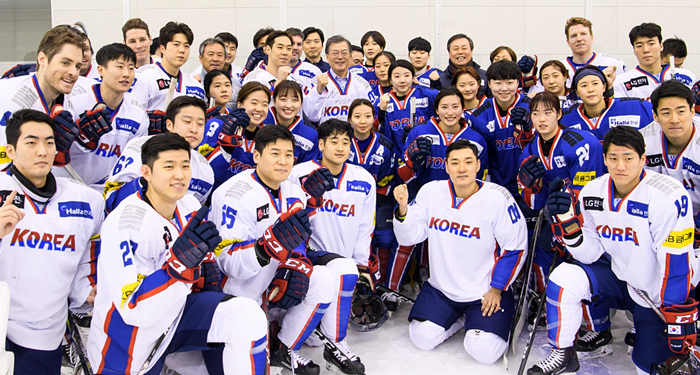
President Moon Jae-in poses for a photo with Team Korea's ice hockey players, wearing a uniform signed by members of both the men's and women's national teams, during a visit to the Jincheon National Training Center on Jan. 17. (Hyoja-dong Studio)
Amid speculation, the high-level talks between the two Koreas took place on Jan. 9, with encouraging developments.
First, it was agreed that North Korean athletes, Olympic Committee members, and cheering squads would all participate in the PyeongChang Winter Games.
The two Koreas then held working-level talks in Panmunjom on Jan. 17, and agreed to march together in the Opening Ceremony under the Korean unification flag.
A few days later, on Jan. 20, the IOC announced the Olympic Korean Peninsula Declaration, which grants accreditation to North Korea to participate in the PyeongChang Games. As such, PyeongChang will welcome 22 North Korean athletes in events covering ice hockey, figure skating, short track speed skating, cross-country skiing and alpine skiing.
Furthermore, the two Korean Olympic committees agreed to form a single women's ice hockey team, comprised of both South and North Korean players. The combined team will wear the Korean unification flag, and will use the folk song "Arirang" as its anthem.
At PyeongChang, cooperation between the two Koreas will extend beyond the sports arena.
North Korea has agreed to send its 140-member Samjiyon Orchestra to perform in Seoul and Gangneung in celebration of the Olympics. The performance troupe will stage a show at the Gangneung Arts Center on Feb. 8, one day before the PyeongChang Opening Ceremony, and another at the National Theater of Korea in Seoul on Feb. 11.
These agreements between the two Koreas, realized under the auspices of the PyeongChang Winter Games, are a journey toward an Olympics of Peace.
In confirming North Korea's participation, IOC President Thomas Bach said, "The PyeongChang 2018 Winter Games will show us what the world could look like if we were guided by the Olympic spirit of respect, dialogue and understanding. This is the Olympic message that will go from PyeongChang to the world."
In true Olympic spirit, the hope is for PyeongChang to shine as a symbol of peace, and for this peace to radiate across the Korean Peninsula, Northeast Asia and the world in the days, months, and years to come.
hlee10@korea.kr
Most popular
- First hearing-impaired K-pop act hopes for 'barrier-free world'
- 'Mad Max' director impressed by 'cinema-literate' Korean viewers
- Romanian presidential couple visits national cemetery
- 'Korean mythology is just as wonderful as Greek and Roman'
- Hit drama 'Beef' wins awards from 3 major Hollywood guilds




